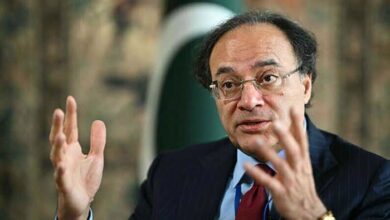The National Assembly Standing Committee on Finance, chaired by MNA Naveed Qamar, on Thursday endorsed the government’s proposal to impose a 10% sales tax on imported solar panels, replacing the earlier suggested 18% rate.
Naveed Qamar clarified that the recommendation to impose a reduced sales tax originated from the committee itself, not the Senate. “We had earlier discussed and proposed no sales tax on solar panels, but now support the government’s revised proposal of 10%,” he said.
Committee member Mubeen Arif, however, suggested that the sales tax should be further reduced to encourage green energy initiatives. Federal Board of Revenue (FBR) Chairman Rashid Mahmood Langrial said parliament has to make the final decision, and the bureau will make the amendments.
Crackdown on tax evaders
Chairman of the Federal Board of Revenue (FBR), Rashid Mahmood Langrial, briefed the committee on the government’s aggressive plans to widen the tax net, as many people in the country are outside of it. Among the proposed measures, the FBR has sought powers to temporarily deactivate bank accounts of individuals and businesses not registered under sales tax laws.
“A notice will be sent first to such persons. If they still fail to register, their bank accounts can be suspended, but reactivated within two days after compliance,” Langrial said. He also stated that unregistered Tier-1 retailers could face disconnection of electricity and gas connections. The matter for permanent closure of bank accounts should be referred to a committee, the chairman suggested.
He revealed alarming figures, saying only 30,000 to 35,000 out of 300,000 industrial units in Pakistan are registered with the FBR. “This means nearly 90% of industrial units are outside the formal tax system,” he noted. The chairman also admitted that electricity theft alone amounts to Rs500-600 billion annually, adding to the economic burden.
Push for tax reform, incentives over punishment
Committee member Sharmila Farooqi stressed the need for incentives over harsher punishments, arguing that punitive measures have failed to yield desired results. “It is better to encourage registration through benefits than to intimidate with penalties,” she remarked. She called for a reduction in the overall tax rate to encourage broader compliance.
The FBR chairman conceded that Pakistan’s tax rate is high, and many registered taxpayers are underreporting income, while a significant portion of the economy continues to operate in the informal sector. Action will be taken against the person who does not register themselves based on their estimated volume of sales, supplies, and business, he stressed.
Finance Minister Muhammad Aurangzeb, while addressing the meeting, made it clear that tax exemptions and amnesty schemes are a thing of the past. “The focus now is on bringing people under the tax net through reforms and effective enforcement,” he said, adding that processes and thresholds would be improved further to ensure fairness. “People’s business models are based on sales tax evasion.”
The committee directed the FBR to include clear safeguards in the proposed legislation regarding the freezing or closure of bank accounts of unregistered individuals. The FBR was asked to resubmit a revised draft with these safeguards included.
The government’s latest tax enforcement drive, coupled with reduced tax rates on key items like solar panels, aims to balance revenue generation with ease of doing business—critical for fostering trust and improving compliance in Pakistan’s struggling tax landscape.







